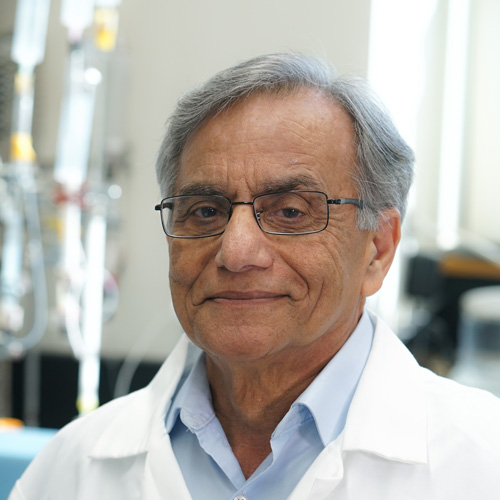Research Interests:
- Expression of type specific virion structural antigens in mammalian cells transformed by herpes simplex virus
- Isolation and characterization of natural human interferons
- Interferon inhibitory activity (IIA) in multiple sclerosis patients
- Role of PSA in angiogenesis
Biography
Dr. Chadha graduated from University of Guelph, Guelph, Ontario, Canada and completed his postdoctoral work as a fellow of National Research Council of Canada. He came to Roswell Park as Assistant Professor of Oncology in 1972 and later was promoted to Associate Professor of Oncology. He also holds a joint appointment as Research Assistant Professor in the Department of Medicine, the School of Medicine, State University of New York at Buffalo. His research interests are largely in the area of Interferons & Other Cytokines and role of Prostate Specific Antigen (PSA) in prostate cancer. Dr. Chadha has authored and co-authored more than 120 journal articles, several reviews and book chapters. He has also edited a book on Interferons and has four US Patents. He has also participated in several national and international meetings as an invited speaker.
Dr. Chadha has served as consultant with Hoffmann-La Roche in the area of Pegylated interferons. He has served on editorial board of several journals and has reviewed publication for several journals including Cancer Research, Clinical Cancer Research, Interferons, Virology, Neoplasia, Oncology, British J Cancer, Cancer Growth & Metastases etc. He has reviewed grants for American Cancer Society, NSF, Department of Veterans Affairs, and Biomedical Research Council etc. He has been major Thesis Advisor for several students for MS, and Ph.D. degrees. He has also served as Thesis advisor for MS and Ph.D. students both nationally and internationally. Dr. Chadha has actively participated in teaching several courses at Roswell Park including Interferons & Cytokines, Molecular Biology of Animal Viruses, Recent Advances in Biochemistry of Neoplasia, Histocompatibility and Immunobiology.
Positions
Roswell Park Comprehensive Cancer Center
- Emeritus Faculty
- Department of Molecular and Cellular Biology
Background
Education and Training
- BSc - Biology, University of Rajasthan, Jaipur, India
- MSc - Plant Pathology & Microbiology, I.A.R.I., New Delhi, India
- PhD - Virology, & Biochemistry, University of Guelph, Ontario, Canada
Professional Memberships
- Editorial Board - J Cancer Science & Therapy
- Editorial Board - The Open Prostate Cancer Journal
Research Overview
Dr. Chadha’s research focus is in the area of interferons and role of PSA in angiogenesis in prostate cancer. Interferons are currently used in the clinic primarily for viral infections and in diseases like multiple sclerosis. However, a significant fraction of patients do not respond to this treatment. The mechanism of lack of this response is not known. We have identified circulating IIA protein in the blood of MS patients that is largely responsible for lack of response to interferon treatment. We are currently involved in further characterization of IIA.
Prostate-specific antigen (PSA) is currently used as a biomarker for early diagnosis and in the treatment of prostate cancer. However, this biomarker is neither disease-specific nor tissue specific. Use of this biomarker results in 70% false positive and 30% false negative results and is responsible for severe undesirable side effects in patients. We have identified a panel of biomarkers that will eliminate these drawbacks of PSA test. The earlier results need to be validated in a larger sample before FDA approval. Both in vitro and in vivo studies in animals we have shown that PSA has antiangiogenic activity and any loss of PSA in normal prostate due to disease condition promotes tumor growth.
Publications
- Bindukumar B, Schwartz S, Aalinkeel R, Mahajan S, Lieberman A, Chadha K. Proteomic profiling of the effect of prostate-specific antigen on prostate cancer cells. Prostate. 2008 Oct 1;68(14):1531-45. doi: 10.1002/pros.20811. PMID: 18646040.
- Aalinkeel R, Bindukumar B, Schwartz SA, Smith GJ, Chadha KC. Role of prostate-specific antigen (PSA) in pathological angiogenesis and prostate tumor growth. In Horizons in Cancer Research. Volume 42 (edi) Hiroto S Watanabe. Nova Science Publishers, Inc ISBN: 978-1-61761-111-7. 2011.
- Chadha KC, Nair BB, Chakravarthi S, Zhou R, Godoy A, Mohler JL, Aalinkeel R, Schwartz SA, Smith GJ. Enzymatic activity of free-prostate-specific antigen (f-PSA) is not required for some of its physiological activities. Prostate. 2011 Nov;71(15):1680-90. doi: 10.1002/pros.21385. Epub 2011 Mar 28. PMID: 21446007; PMCID: PMC4498389.
- Chadha KC, Miller A, Nair BB, Schwartz SA, Trump DL, Underwood W. New serum biomarkers for prostate cancer diagnosis. Clin Cancer Investig J. 2014;3(1):72-79. doi: 10.4103/2278-0513.125802. PMID: 25593898; PMCID: PMC4292911.
- Chadha KC, Nair B, Godoy A, Rajnarayanan R, Nabi E, Zhou R, Patel NR, Aalinkeel R, Schwartz SA, Smith GJ. Anti-angiogenic activity of PSA-derived peptides. Prostate. 2015 Sep;75(12):1285-99. doi: 10.1002/pros.23010. Epub 2015 May 11. PMID: 25963523.
- Aalinkeel R, Nair B, Chen CK, Mahajan SD, Reynolds JL, Zhang H, Sun H, Sykes DE, Chadha KC, Turowski SG, Bothwell KD, Seshadri M, Cheng C, Schwartz SA. Nanotherapy silencing the interleukin-8 gene produces regression of prostate cancer by inhibition of angiogenesis. Immunology. 2016 Aug;148(4):387-406. doi: 10.1111/imm.12618. PMID: 27159450; PMCID: PMC4948039.
